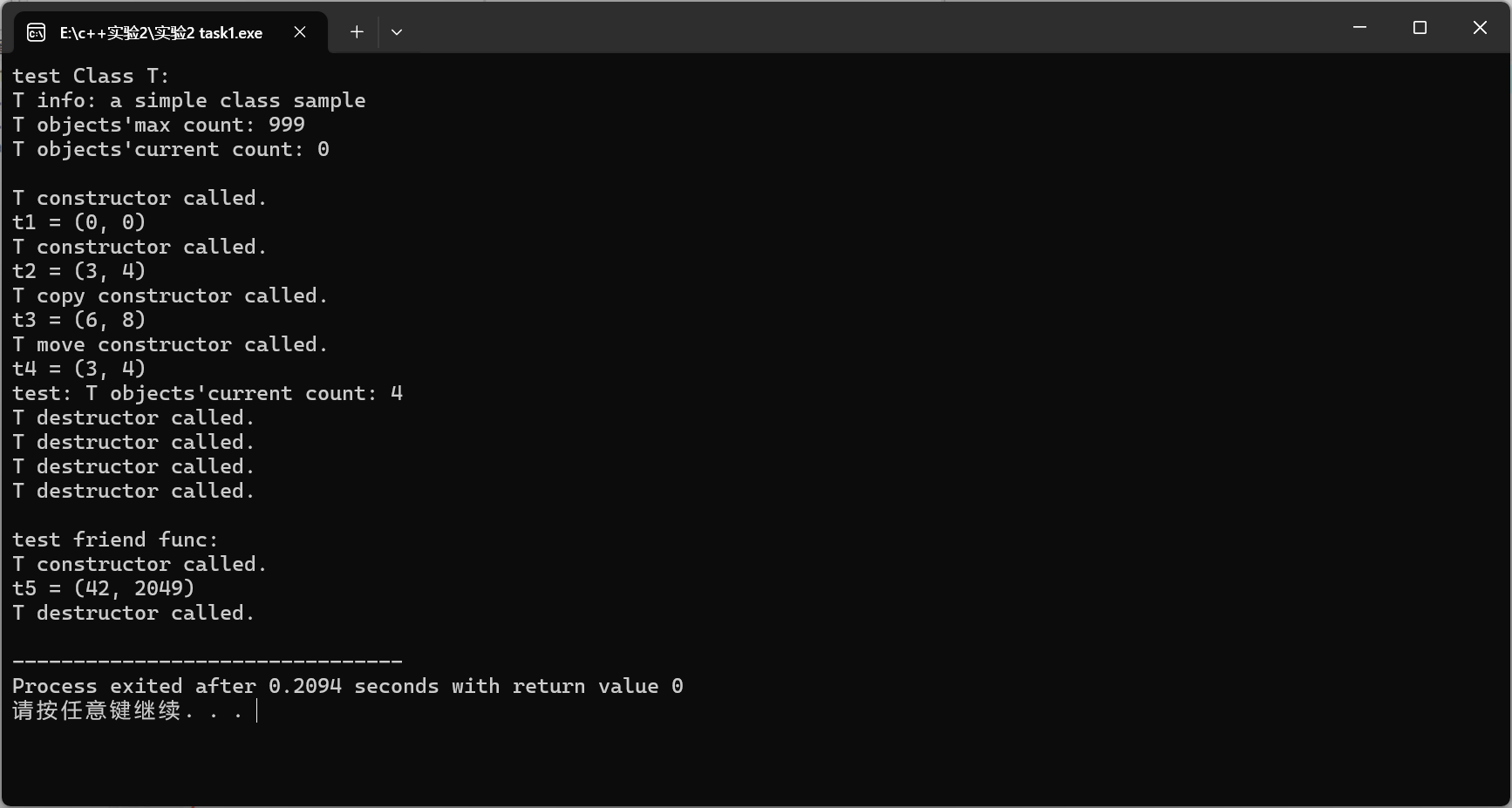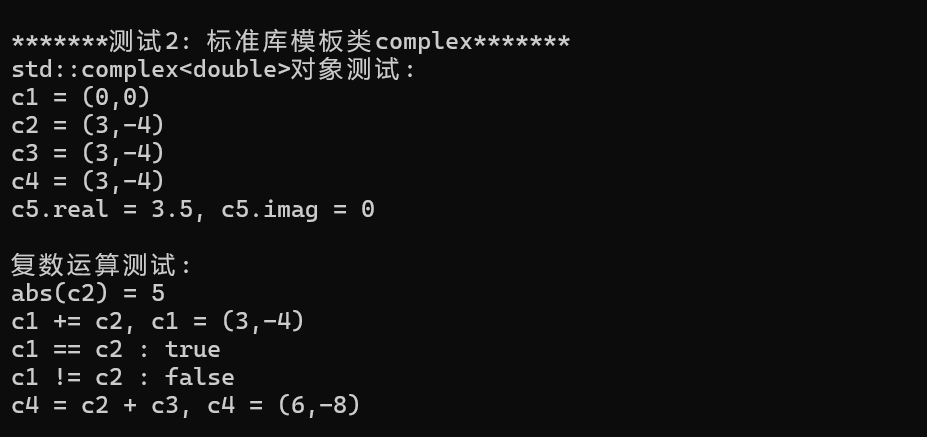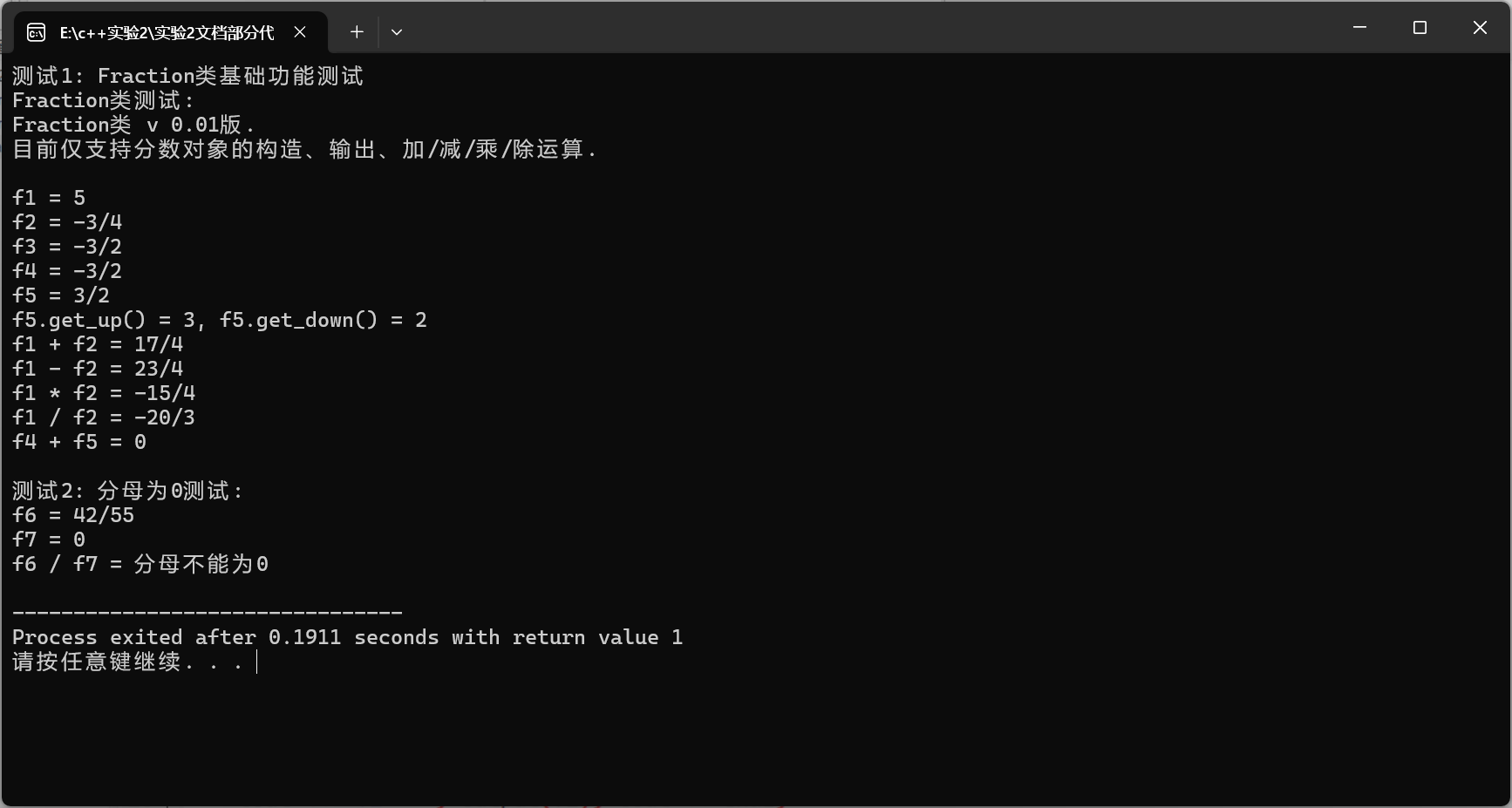实验二
实验任务
源代码如下:
T.h
点击查看代码
#pragma once
#include <string>
class T {
public:
T(int x = 0, int y = 0);
T(const T &t);
T(T &&t);
~T();
void adjust(int ratio);
void display() const;
private:
int m1, m2;
public:
static int get_cnt();
public:
static const std::string doc;
static const int max_cnt;
private:
static int cnt;
friend void func();
};
void func();
点击查看代码
#include "T.h"
#include <iostream>
#include <string>
const std::string T::doc{"a simple class sample"};
const int T::max_cnt = 999;
int T::cnt = 0;
int T::get_cnt() {
return cnt;
}
T::T(int x, int y): m1{x}, m2{y} {
++cnt;
std::cout << "T constructor called.\n";
}
T::T(const T &t): m1{t.m1}, m2{t.m2} {
++cnt;
std::cout << "T copy constructor called.\n";
}
T::T(T &&t): m1{t.m1}, m2{t.m2} {
++cnt;
std::cout << "T move constructor called.\n";
}
T::~T() {
--cnt;
std::cout << "T destructor called.\n";
}
void T::adjust(int ratio) {
m1 *= ratio;
m2 *= ratio;
}
void T::display() const {
std::cout << "(" << m1 << ", " << m2 << ")" ;
}
void func() {
T t5(42);
t5.m2 = 2049;
std::cout << "t5 = "; t5.display(); std::cout << '\n';
}
点击查看代码
#include "T.h"
#include <iostream>
void test_T();
int main() {
std::cout << "test Class T: \n";
test_T();
std::cout << "\ntest friend func: \n";
func();
}
void test_T() {
using std::cout;
using std::endl;
cout << "T info: " << T::doc << endl;
cout << "T objects'max count: " << T::max_cnt << endl;
cout << "T objects'current count: " << T::get_cnt() << endl << endl;
T t1;
cout << "t1 = "; t1.display(); cout << endl;
T t2(3, 4);
cout << "t2 = "; t2.display(); cout << endl;
T t3(t2);
t3.adjust(2);
cout << "t3 = "; t3.display(); cout << endl;
T t4(std::move(t2));
cout << "t4 = "; t4.display(); cout << endl;
cout << "test: T objects'current count: " << T::get_cnt() << endl;
}
运行截图:

问题回答:
1.T.h中,在类T内部,已声明 func 是T的友元函数。在类外部,去掉line36,重新编译,程序能否正常运行。如果能,回答YES;如果不能,以截图形式提供编译报错信息,说明原因。
报错信息:

不能。因为虽然func在类内声明为友元,但在其他文件(如 task1.cpp)调用func时,需提前声明该函数,否则编译器无法识别函数原型。
2.T.h中,line9-12给出了各种构造函数、析构函数。总结它们各自的功能、调用时机。
普通构造函数(T (int x=0, int y=0)):功能是初始化对象的m1和m2,并递增对象计数cnt;调用时机为创建新对象时。
复制构造函数(T (const T &t)):功能是用已有对象初始化新对象,复制m1和m2并递增cnt;调用时机为用已有对象创建新对象、函数参数为值传递或函数返回值为对象时。
移动构造函数(T (T &&t)):功能是复制m1和m2并递增cnt,避免资源拷贝;调用时机为用右值对象初始化新对象时。
析构函数(~T ()):功能是递减对象计数cnt;调用时机为对象生命周期结束时。
3. T.cpp中,line13-15,剪切到T.h的末尾,重新编译,程序能否正确编译。如不能,以截图形式给出报错信息,分析原因。
报错信息:

不能。静态成员在类内声明,需在类外定义初始化,若在.h 文件中初始化,多次包含该头文件会导致静态成员重复定义,触发编译错误。
实验任务2
源代码如下:
Complex.h
点击查看代码
#pragma once
#include <string>
class Complex {
public:
static const std::string doc;
private:
double real;
double imag;
public:
Complex();
Complex(double r);
Complex(double r, double i);
Complex(const Complex& other);
double get_real() const;
double get_imag() const;
void add(const Complex& other);
public:
friend void output(const Complex& c);
friend double abs(const Complex& c);
friend Complex add(const Complex& c1, const Complex& c2);
friend bool is_equal(const Complex& c1, const Complex& c2);
friend bool is_not_equal(const Complex& c1, const Complex& c2);
};
点击查看代码
#include "Complex.h"
#include <iostream>
#include <cmath>
const std::string Complex::doc = "a simplified complex class";
Complex::Complex() : real(0.0), imag(0.0) {}
Complex::Complex(double r) : real(r), imag(0.0) {}
Complex::Complex(double r, double i) : real(r), imag(i) {}
Complex::Complex(const Complex& other) : real(other.real), imag(other.imag) {}
double Complex::get_real() const { return real; }
double Complex::get_imag() const { return imag; }
void Complex::add(const Complex& other) {
this->real += other.real;
this->imag += other.imag;
}
void output(const Complex& c) {
std::cout << c.real;
const double eps = 1e-9;
if (fabs(c.imag) < eps) {
if (fabs(c.real) < eps) {
std::cout << "+0i";
}
}
else if (c.imag > eps) {
std::cout << "+" << c.imag << "i";
}
else {
std::cout << c.imag << "i";
}
}
double abs(const Complex& c) {
return sqrt(c.real * c.real + c.imag * c.imag);
}
Complex add(const Complex& c1, const Complex& c2) {
return Complex(c1.real + c2.real, c1.imag + c2.imag);
}
bool is_equal(const Complex& c1, const Complex& c2) {
return (fabs(c1.real - c2.real) < 1e-9) && (fabs(c1.imag - c2.imag) < 1e-9);
}
bool is_not_equal(const Complex& c1, const Complex& c2) {
return !is_equal(c1, c2);
}
点击查看代码
#include "Complex.h"
#include <iostream>
#include <iomanip>
#include <complex>
void test_Complex();
void test_std_complex();
int main() {
std::cout << "*******测试1: 自定义类Complex*******\n";
test_Complex();
std::cout << "\n*******测试2: 标准库模板类complex*******\n";
test_std_complex();
}
void test_Complex() {
using std::cout;
using std::endl;
using std::boolalpha;
cout << "类成员测试: " << endl;
cout << Complex::doc << endl << endl;
cout << "Complex对象测试: " << endl;
Complex c1;
Complex c2(3, -4);
Complex c3(c2);
Complex c4 = c2;
const Complex c5(3.5);
cout << "c1 = "; output(c1); cout << endl;
cout << "c2 = "; output(c2); cout << endl;
cout << "c3 = "; output(c3); cout << endl;
cout << "c4 = "; output(c4); cout << endl;
cout << "c5.real = " << c5.get_real()
<< ", c5.imag = " << c5.get_imag() << endl << endl;
cout << "复数运算测试: " << endl;
cout << "abs(c2) = " << abs(c2) << endl;
c1.add(c2);
cout << "c1 += c2, c1 = "; output(c1); cout << endl;
cout << boolalpha;
cout << "c1 == c2 : " << is_equal(c1, c2) << endl;
cout << "c1 != c2 : " << is_not_equal(c1, c2) << endl;
c4 = add(c2, c3);
cout << "c4 = c2 + c3, c4 = "; output(c4); cout << endl;
}
void test_std_complex() {
using std::cout;
using std::endl;
using std::boolalpha;
cout << "std::complex<double>对象测试: " << endl;
std::complex<double> c1;
std::complex<double> c2(3, -4);
std::complex<double> c3(c2);
std::complex<double> c4 = c2;
const std::complex<double> c5(3.5);
cout << "c1 = " << c1 << endl;
cout << "c2 = " << c2 << endl;
cout << "c3 = " << c3 << endl;
cout << "c4 = " << c4 << endl;
cout << "c5.real = " << c5.real()
<< ", c5.imag = " << c5.imag() << endl << endl;
cout << "复数运算测试: " << endl;
cout << "abs(c2) = " << abs(c2) << endl;
c1 += c2;
cout << "c1 += c2, c1 = " << c1 << endl;
cout << boolalpha;
cout << "c1 == c2 : " << (c1 == c2)<< endl;
cout << "c1 != c2 : " << (c1 != c2) << endl;
c4 = c2 + c3;
cout << "c4 = c2 + c3, c4 = " << c4 << endl;
}
运行截图:


问题回答:
1.比较自定义类 Complex 和标准库模板类 complex 的用法,在使用形式上,哪一种更简洁?函数和运算内在有关联吗?
标准库更简洁,其支持运算符重载,直接通过运算符实现运算,符合自然数学表达,而且自定义类需通过成员函数或全局函数实现,形式较繁琐。两者运算逻辑一致(如加法均为实部加实部、虚部加虚部),仅接口形式不同。
2.
2-1:自定义 Complex 中, output/abs/add/ 等均设为友元,它们真的需要访问 私有数据 吗?(回答“是/否”并给出理由)
是。output()需访问real和imag以格式化输出;abs()需通过real和imag计算模(sqrt(real²+imag²));add()需获取两个复数的real和imag才能计算和,因此必须设为友元访问私有数据。
2-2:标准库 std::complex 是否把 abs 设为友元?(查阅 cppreference后回答)
否。标准库std::complex的abs函数并非友元,而是通过调用std::complex的公有接口获取复数的实部和虚部,进而计算模长。
2-3:什么时候才考虑使用 friend?总结你的思考
友元的核心作用是 “打破类的封装性,允许特定外部函数或类访问私有成员,仅当外部函数或类需要访问当前类的私有成员,且无法通过公有接口间接获取时,才考虑使用friend。
3. 如果构造对象时禁用=形式,即遇到 Complex c4 = c2; 编译报错,类Complex的设计应如何调整?
在Complex.h的类声明中,修改复制构造函数的声明,添加explicit关键字:
// 原复制构造函数声明
Complex(const Complex& other);
// 调整后声明
explicit Complex(const Complex& other);
实验任务3
源代码如下:
PlayerControl.h
点击查看代码
#pragma once
#include <string>
enum class ControlType {Play, Pause, Next, Prev, Stop, Unknown};
class PlayerControl {
public:
PlayerControl();
ControlType parse(const std::string& control_str);
void execute(ControlType cmd) const;
static int get_cnt();
private:
static int total_cnt;
};
点击查看代码
#include "PlayerControl.h"
#include <iostream>
#include <algorithm>
#include <string>
int PlayerControl::total_cnt = 0;
PlayerControl::PlayerControl() {}
ControlType PlayerControl::parse(const std::string& control_str) {
std::string lower_str = control_str;
std::transform(lower_str.begin(), lower_str.end(), lower_str.begin(),
[](unsigned char c) { return std::tolower(c); });
if (lower_str == "play") {
total_cnt++;
return ControlType::Play;
}
else if (lower_str == "pause") {
total_cnt++;
return ControlType::Pause;
}
else if (lower_str == "next") {
total_cnt++;
return ControlType::Next;
}
else if (lower_str == "prev") {
total_cnt++;
return ControlType::Prev;
}
else if (lower_str == "stop") {
total_cnt++;
return ControlType::Stop;
}
else {
return ControlType::Unknown;
}
}
void PlayerControl::execute(ControlType cmd) const {
switch (cmd) {
case ControlType::Play:
std::cout << "[play] Playing music...\n";
break;
case ControlType::Pause:
std::cout << "[Pause] Music paused\n";
break;
case ControlType::Next:
std::cout << "[Next] Skipping to next track\n";
break;
case ControlType::Prev:
std::cout << "[Prev] Back to previous track\n";
break;
case ControlType::Stop:
std::cout << "[Stop] Music stopped\n";
break;
default:
std::cout << "[Error] unknown control\n";
break;
}
}
int PlayerControl::get_cnt() {
return total_cnt;
}
点击查看代码
#include "PlayerControl.h"
#include <iostream>
void test() {
PlayerControl controller;
std::string control_str;
std::cout << "Enter Control: (play/pause/next/prev/stop/quit):\n";
while(std::cin >> control_str) {
if(control_str == "quit")
break;
ControlType cmd = controller.parse(control_str);
controller.execute(cmd);
std::cout << "Current Player control: " << PlayerControl::get_cnt() << "\n\n";
}
}
int main() {
test();
}
运行截图:

实验任务4
源代码如下:
Fraction.h
点击查看代码
#pragma once
#include <string>
class Fraction {
friend void output(const Fraction& f);
friend Fraction add(const Fraction& f1, const Fraction& f2);
friend Fraction sub(const Fraction& f1, const Fraction& f2);
friend Fraction mul(const Fraction& f1, const Fraction& f2);
friend Fraction div(const Fraction& f1, const Fraction& f2);
public:
static const std::string doc;
Fraction(int up, int down = 1);
Fraction(const Fraction& f);
int get_up() const;
int get_down() const;
Fraction negative() const;
private:
int up;
int down;
void reduce();
int gcd(int a, int b) const;
};
点击查看代码
#include "Fraction.h"
#include <iostream>
#include <cmath>
const std::string Fraction::doc = "Fraction类 v 0.01版.\n目前仅支持分数对象的构造、输出、加/减/乘/除运算.";
Fraction::Fraction(int up, int down) : up(up), down(down) {
if (down == 0) {
std::cerr << "分母不能为0" << std::endl;
exit(1);
}
if (down < 0) {
up = -up;
down = -down;
}
if (up == 0) {
down = 1;
}
reduce();
}
Fraction::Fraction(const Fraction& f) : up(f.up), down(f.down) {}
int Fraction::get_up() const { return up; }
int Fraction::get_down() const { return down; }
Fraction Fraction::negative() const {
return Fraction(-up, down);
}
int Fraction::gcd(int a, int b) const {
a = abs(a);
b = abs(b);
while (b != 0) {
int temp = b;
b = a % b;
a = temp;
}
return a;
}
void Fraction::reduce() {
if (up == 0) {
down = 1;
return;
}
int common_divisor = gcd(up, down);
up /= common_divisor;
down /= common_divisor;
if (down < 0) {
up = -up;
down = -down;
}
}
void output(const Fraction& f) {
if (f.up == 0) {
std::cout << 0;
} else if (f.down == 1) {
std::cout << f.up;
} else {
std::cout << f.up << "/" << f.down;
}
}
Fraction add(const Fraction& f1, const Fraction& f2) {
int new_up = f1.up * f2.down + f2.up * f1.down;
int new_down = f1.down * f2.down;
return Fraction(new_up, new_down);
}
Fraction sub(const Fraction& f1, const Fraction& f2) {
int new_up = f1.up * f2.down - f2.up * f1.down;
int new_down = f1.down * f2.down;
return Fraction(new_up, new_down);
}
Fraction mul(const Fraction& f1, const Fraction& f2) {
int new_up = f1.up * f2.up;
int new_down = f1.down * f2.down;
return Fraction(new_up, new_down);
}
Fraction div(const Fraction& f1, const Fraction& f2) {
if (f2.up == 0) {
std::cerr << "分母不能为0" << std::endl;
exit(1);
}
int new_up = f1.up * f2.down;
int new_down = f1.down * f2.up;
return Fraction(new_up, new_down);
}
点击查看代码
#include "Fraction.h"
#include <iostream>
void test1();
void test2();
int main() {
std::cout << "测试1: Fraction类基础功能测试\n";
test1();
std::cout << "\n测试2: 分母为0测试: \n";
test2();
}
void test1() {
using std::cout;
using std::endl;
cout << "Fraction类测试: " << endl;
cout << Fraction::doc << endl << endl;
Fraction f1(5);
Fraction f2(3, -4), f3(-18, 12);
Fraction f4(f3);
cout << "f1 = "; output(f1); cout << endl;
cout << "f2 = "; output(f2); cout << endl;
cout << "f3 = "; output(f3); cout << endl;
cout << "f4 = "; output(f4); cout << endl;
const Fraction f5(f4.negative());
cout << "f5 = "; output(f5); cout << endl;
cout << "f5.get_up() = " << f5.get_up()
<< ", f5.get_down() = " << f5.get_down() << endl;
cout << "f1 + f2 = "; output(add(f1, f2)); cout << endl;
cout << "f1 - f2 = "; output(sub(f1, f2)); cout << endl;
cout << "f1 * f2 = "; output(mul(f1, f2)); cout << endl;
cout << "f1 / f2 = "; output(div(f1, f2)); cout << endl;
cout << "f4 + f5 = "; output(add(f4, f5)); cout << endl;
}
void test2() {
using std::cout;
using std::endl;
Fraction f6(42, 55), f7(0, 3);
cout << "f6 = "; output(f6); cout << endl;
cout << "f7 = "; output(f7); cout << endl;
cout << "f6 / f7 = "; output(div(f6, f7)); cout << endl;
}
运行截图:

问题回答:
分数的输出和计算, output/add/sub/mul/div ,你选择的是哪一种设计方案?(友元/自由函数/命名空间+自由函数/类+static)你的决策理由?如友元方案的优缺点、静态成员函数方案的适用场景、命名空间方案的考虑因素等。
我选择友元方案。
工具函数需要直接访问Fraction的私有成员(up和down),友元可避免通过get_up()/get_down()间接访问,提升代码效率。并且还可以保持工具函数的 “全局函数” 特性,调用方式与实验测试代码一致,无需修改原测试逻辑。在类的封装性上仅对必要函数开放权限,封装破坏可控。



 浙公网安备 33010602011771号
浙公网安备 33010602011771号